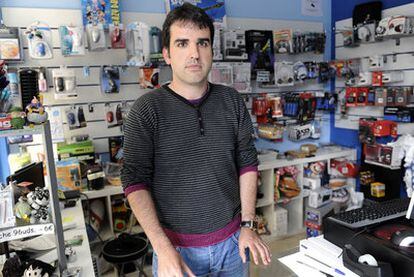"Nintendo's blackmail will ruin me"
Game firm demanding prison for storekeeper selling console-compatible cartridges
After making his business dream a reality, Alejandro Fernández could soon see it turn into a nightmare. Nintendo is asking for a 23-year prison sentence for the Avilés computer store owner, as well as 840,000 euros in compensation, for selling cartridges that allow the storage of videogames for its DS console. The Japanese computer entertainment giant considers the cartridges "illegal" because they allow the use of pirated games. In its written accusation, it also blames Fernández for violating its trademark and design and revealing trade secrets.
Fernández, 31, however, is relaxed ahead of the trial, which was due to begin this week. "At last I will be able to defend myself," he says. The public prosecutor is requesting a lighter punishment - a three-and-a-half-year sentence and 12,960 euros in compensation for two crimes, one against intellectual property and another against industry.
The Asturian owner of the Alechip.com computer shop rejects all the accusations against him. "I have never sold anything pirated, but rather computer goods, including original Nintendo consoles, games and accessories," he says. "But I also sell compatible accessories and they don't like that. Why are they going for the store owners? Why are they not going for China, which is where all these devices are made?"
The cartridges (or R4 cards) that Fernández sells don't just serve to store Nintendo DS games that have been downloaded for free, but also to extend the functionality of the console so it can play music or show movies. There are even applications to turn the DS in a reservation management device for hotels.
Fernández first ran into problems with his business, which he began in his parents' garage in 2005, in 2008 when Nintendo began blocking the products - up to a value of 70,000 eurosthat he was importing from China at customs. "They called me and gave me two options: pay 3,000 euros or go to court. I paid the first two times [...] but then I rebelled and at that moment lawsuits started to rain down on me until they took me to court." The first suit was shelved; the second was won in a commercial procedure, but it was appealed, he explains.
In the trial, Nintendo will argue that the cartridges constitute piracy. After the first sentence declaring them illegal was handed down six months ago, Nintendo deputy director Rafael Martínez said: "Spain is the country most affected by piracy. There is a certain tradition, a feeling that it is there for everyone and intellectual property is not valued." Since then similar cases have been shelved or thrown out by the Spanish courts.
In its written accusation, it adds that the lawsuit extends to the sale of illegal products intended to break the security protection on the console, because the cartridges only work with the Nintendo DS. This constitutes a breach of "someone else's industrial design," which is to say they are based on the original. The manufacturer also considers they constitute a trademark breach, because they contain secret information "included in software or computer code."
Fernández sees it completely the other way around. "They sell neutered consoles so only the contents that they sell can be reproduced. These cartridges are not designed to pirate games, nor to violate copyright, nor any trademark, but rather to give other uses to consoles, genuine computers, that without them would be impossible to realize."
Fernández confesses that when this nightmare began he was scared, but not now. "If I accept the blackmail, they will bring me to ruin. If I give in, how can I look my wife, my son and my clients and suppliers in the face? I am ready to take it to the end."











































